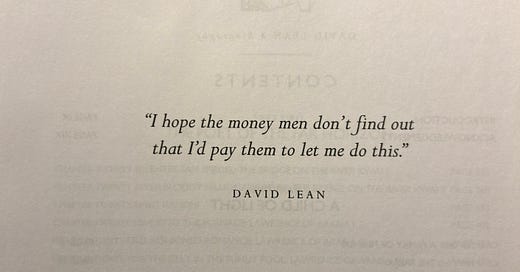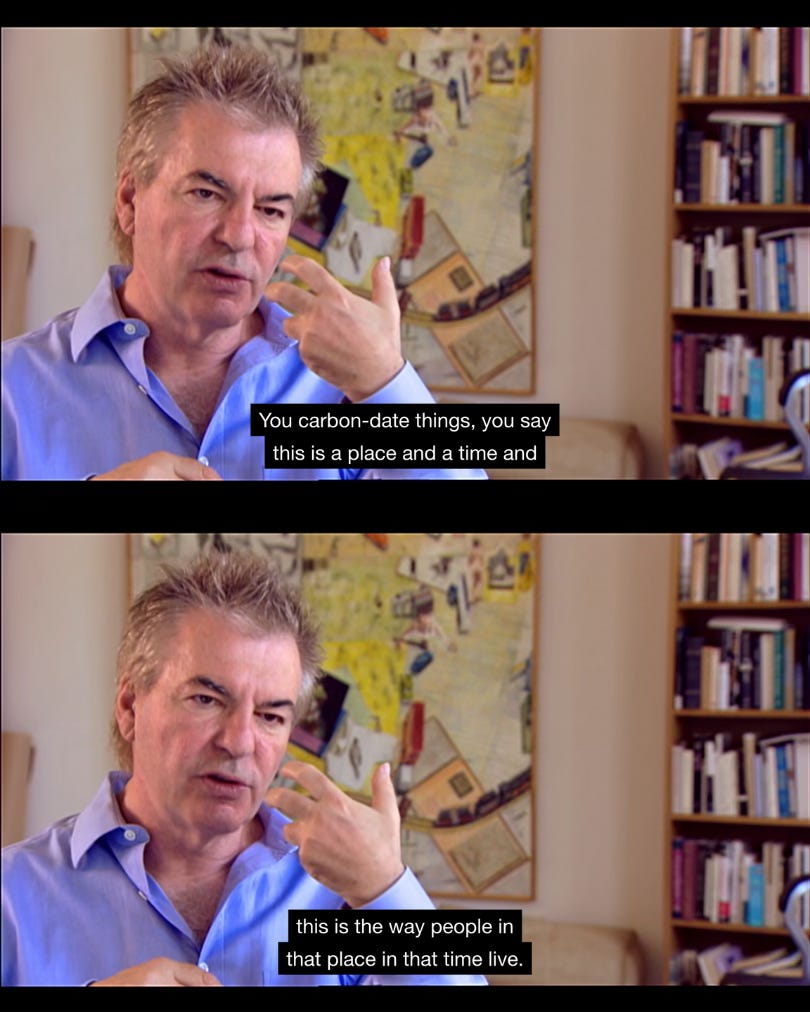Can We Forgive Ourselves? | Revival Cinema Project
Hypocrisy, Self-Betrayal, and a Lack Of Imagination aren't crimes.
Hello
It’s been a long time.
I know what most of you are thinking- I thought the next greeting would be in person or the next newsletter would share details of the physical meetup in Mumbai. Unfortunately, this is not that mail.
Time blurred the passage of life for me in the past few months. Work, social commitments, and personal obligations accrued on the more vital parts of my life - such as watching films. When time slowed down, life was sublime, even outside the confines of cinema. I will try my best to translate a few moments into words later.
My quest to find a suitable place for a physical meet-up took much more effort than I had expected. I am still following up on a few leads but if anyone wishes to offer any suggestions for a place which can accommodate 10-15 folks on a weekend for 1-2 hours for an intense discussion for a low cost, please do share them with me. I will finalise a place on priority and share the details soon.
(Yes, I know you have seen this speech perhaps. Yet, merits repeating.)
In the meanwhile, I thought of bringing up a question which I feel is important for any individual or community to confront before embarking on a real, transformative journey.
In 2021, I had created a manifesto called “Filmmaking For The Apocalypse”. This is what it opened with:
“This is a present from a small, distant world, a token of our sounds, our science, our images, our music, our thoughts and our feelings. We are attempting to survive our time so we may live into yours.” - Jimmy Carter
In 1977, NASA launched the Voyager probes with Voyager Golden Records, meant to convey the diversity of life on Earth through sounds and images. The time capsules departed in the hope of being found by intelligent, extra-terrestrial life. This, I believe, now remains the sole goal of 21st Century film-making.
Meaning is dead. Change is managed. Thought is an enemy of consumption. Staring at an abyss of our own making has made us assume a wild non-human form, more perverse in its behaviour than the work of our descendants. There is no satisfaction or finale, and billions are being made from this tragedy. We are a species engaged in a collective pattern of self-harm, in the hopes that the horrors of climate change, inequality, and decay can be avoided.
Everything is being made. Nothing is being said. So what can you hold onto?
For those who wish to read the whole thing, you can find it here. My present focus however, is how I had ended it.
You may think these are rules; but rules are meant to be broken. And they will be. Guidelines are eventually and always, watered down into nothingness. What lies above are simply hopes. If you have read them and somewhere agree with the whole or the part of it, I invite you to read and explore these thoughts by yourself further, at every chance you get.
In the age of likes, let’s aim for a legacy. An expansive, human legacy.
Yup. I chickened out.
Manifestos are supposed to be composed of a stronger will and rhetoric, and they certainly aren’t supposed to undermine their own potency. The fear that I had talked about in the previous newsletter was certainly present; could I afford to piss off a few people and get myself excluded from opportunities in such a relationship based and risk averse ecosystem? But there was another more practical reason for this curious ending - the fear of hypocrisy.
I considered hypocrisy a mortal sin. To be inconsistent in thought and action was the ultimate act of self-sabotage for me. If I made many a bold declaration and I was forced to take up an opportunity tomorrow which ran counter to the very thoughts and principles I espoused here, how could I live with myself? I was obviously in denial that I already was living as a hypocrite in many ways.
I have now come to see that self-betrayal and a thinning of the human imagination are deemed essential ingredients for survival in today’s world. The humanity of it would have been fine for me; were it not for the fact that the shame around these concepts fostered a kind of defensiveness, denial, and worse, empowering of the status quo.
Just being a human being is a radical move at this moment in history.
-Ted Gioia, The Honest Broker
If we are to confront the many challenges in front of us, not just in cinema, but in a world spinning out of all sense of normalcy and familiarity, we must first start with an honest acknowledgement of our choices, the “free will” which caused them, and how we can move past them.
So to that end, I must ask you, the reader, a very difficult question - Can you forgive yourself?
We will all have our own questions and answers for the same. I would still like to list a few which are circling in my head, and perhaps, they find some resonance with you too.
Can I forgive myself for believing, sometimes sincerely, that I could be able to make my dreams come true while earning huge amounts of money?
Can you forgive yourself for the time you made a professional choice for survival, while your instinct told you it was a mistake? Can you view that person with a bit of compassion?
When I was a child, the following saying was immensely popular- “when the last leaf falls, we will realise that we cannot eat money.”
Can we forgive ourselves for living in an age where a TechBro who will hear this saying is more likely to work on making edible money than he is to work towards a sustainable environment for all by making difficult sacrifices?
In a highly unequal world, where wealth and power are concentrated in the hands of the few, I forgive myself for pretending that I am free. I thought it was the only way to remain sane
Can we forgive ourselves for allowing the jargons of business culture to seep into the world of films? When did we allow an audience to be replaced by consumers? Say the word audience, and I find myself conjuring up images of a fascinated witness, like a child watching a balloon for the first time. A consumer on the other hand is the same child creating a ruckus in the store because he is being denied his regular sugar fix.
As the tiniest slivers of human boredom are sedated by new forms of entertainment and the line between television and cinema is perverted to the detriment of both these wonderful artforms, I hope we can find some courage to look at how our active and passive efforts have helped create not just a conformist and dull viewer, but also a distracted and uncritical citizen.
Can we forgive ourselves for thinking, or rather wanting to think, that anything could ever be apolitical? That art and politics can be kept separate? That what happens in the larger outside world plays no role in the creation of art?
Ever since Oscar Wilde declared the artist’s role in The Model Millionaire- “our business is to realise the world as we see it, not to reform it as we know it”- no agreement has been reached as to whether art exists to show a truth or to decorate it into what it could be. I am not disappointed in Indian cinema for taking a side- I am rather disappointed that it refused to be a part of this debate completely. The gap between what our mainstream screens show and the meaning Indians of today seek hasn’t been achieved by accident.
Lastly, can I forgive myself for my idealism? For the price I have paid for being me? For the punishments I have endured for my intolerance, stupidity, and obstinacy? I am not trying to draw some faux sympathy or shower myself with some compliments. I have made terrible mistakes in the name of integrity and discomfort. I have covered my cowardice in the flags of sacrifice and martyrdom. And I have not yet learnt my lesson.
“Well when events change, I change my mind. What do you do?”
- Paul Samuelson. Also attributed to JM Keynes. A famous reply to those who yell ‘hypocrite’.
If I have lost you a bit, I will sum it up in simple terms. We must relinquish this idea that the individual who must be a part of a corrupt, unstable, and harsh system is somehow more responsible and guilty than those the system serves disproportionately in the first place. We are all hypocrites. We have betrayed ourselves at some point in the hopes of earning some money, goodwill, love, validation, and a project. We have all tried to keep our imagination firmly tied to our work but rarely have we tried to apply the same imagination to the way films are made in this country.
Let’s cut ourselves some slack and gently reconnect with that dream of cinema which made us come here in the first place.
Still here? Not unsubscribed? Thank you. I must share some wonderful things I have been involved in or experienced.
I watched Satyajit Ray’s Nayak on the big screen for the first time. I watched Lootera on the big screen for the first time and cried. Not just because of the film; but because of the filmmaking which created it. Blessed times in the theater. I tried to find some rationale behind the success of re-releases. Infact, using PVR Inox’s SCREENIT I have listed a show of Nipun Dharmadhikari’s Me Vasantrao, one of the best biopics of recent times, for next month in Mumbai. 24th May. 5 PM. You can book your ticket here.
I started volunteering with The Parallel Cinema Club’s Mumbai Chapter. We showed Sans Soleil (1983), Koyaanisqatsi (1982), and Shadows (1959). Our next screening is Anantaram by Adoor Gopalkrishnan. If you wish to attend, please register.
Jean-Pierre Gorin on what Chris Marker, director of Sans Soleil, was obsessed with in his cinema. When was the last time you felt an Indian film was “carbon dating” our times?
Now coming to the most surreal day of 2025. I attended a conversation on Tyeb Mehta and M.F. Husain and their relationship to Indian cinema at Alfred Talkies in Grant Road. The talk by itself would have been passable enough- until it reached a stage which I found disturbing. An elderly gentleman is bought on stage to join the five panellists. The ten minutes or more conversation which follows sees the moderator and to some extent, even the audience, treat him as an exotic being - a means of amusement on that hot uncomfortable Saturday afternoon.
The elderly man was S. Rehman. He followed his father in working at Alfred Talkies, painting posters of the new releases. By his own estimate, he must have been working for about sixty years now. The talk took place a few feet away from his workplace, where he still sits and paints- now for himself.
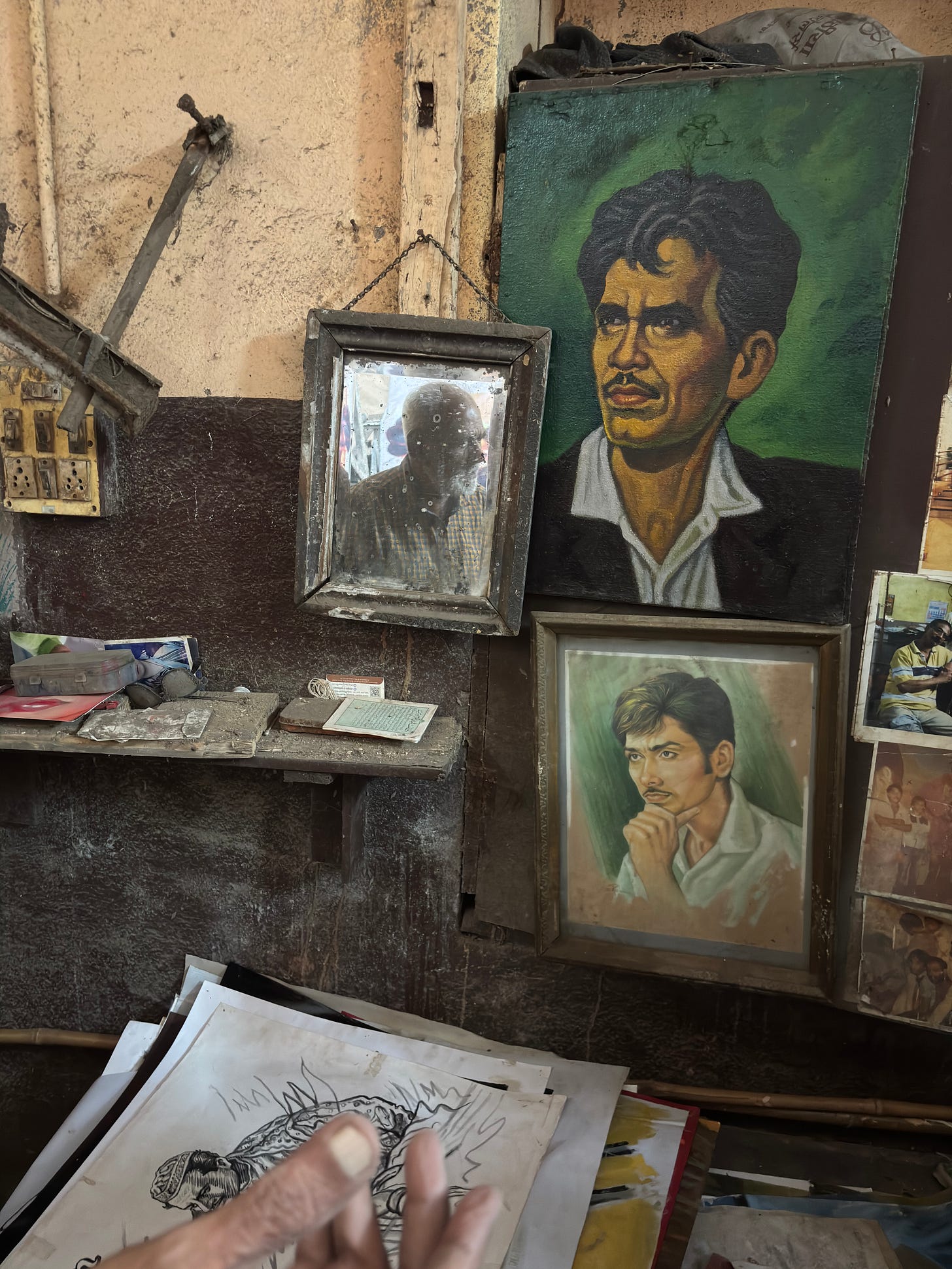
Once the official program was over, a group of us congregated at his corner as he showed us his drawings and paintings, one after the other, most of them his reproductions or interpretations of classic films. When the crowd left, I enquired if a few of the works which caught my eye could be purchased. He said yes.
He struggled to find a blade to cut two of the paintings out. The scissor proved to be ineffective. The theatre is often given for shoots and the last production had damaged a small cabinet he had. He couldn’t find the blade. I got him a paper cutter and it did the job. He gave me the works and I handed him the cash. I left with paintings of Pyaasa and Kaagaz Ke Phool and a sketch of Chaudhvin Ka Chand.
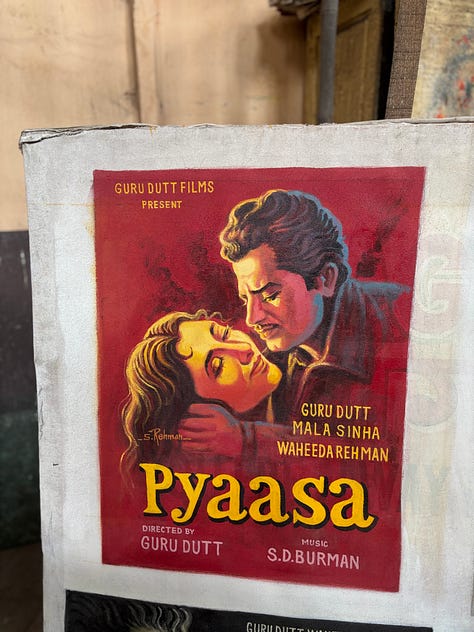
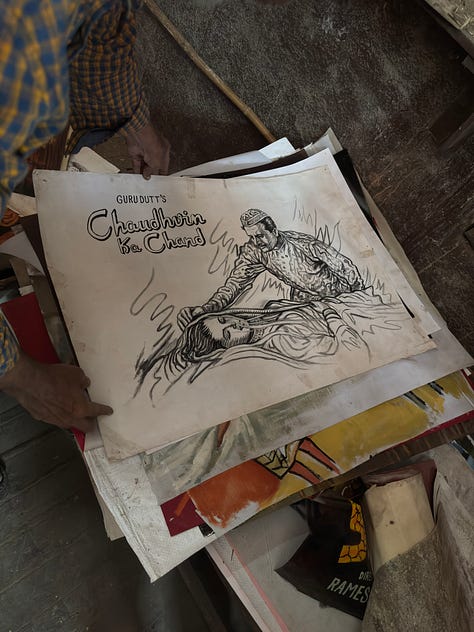
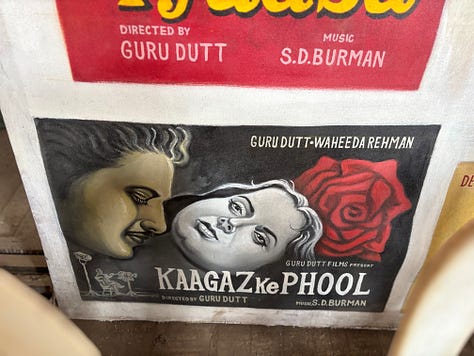
I thought it was fate that I must land up at this program, by a complete chance, on someone else’s booking since they couldn’t make it, only to meet Guru Dutt, again. But now, since that day, I wonder more about what my meeting with Rehman meant.
The esteemed audience gathered there to talk about two well known painters and yet, the person invisible to us all, was an artist too. The theatre has fallen on hard times and his trade of handmade film posters is gone. I have a wonderful Pyaasa poster made by Shiraz of the Khwaab Tanha Collective and a print of an Atul Dodiya painting on Kaagaz Ke Phool. They are esteemed artists, saved in privilege of discovery and a certain savviness to navigate the modern world. But who is to say Rehman doesn’t belong in the same group?
There are colours and brushes and canvases around him. The art goes on. For who? For himself? Perhaps I will get to ask him one day, and he, who is now bothered by folks who wish to revere him or romanticise him but not see him, will give me the same tired answer.
I will fail to see him. But what I see when I look at his works is a dedication I am inspired by. I had to save as much of it as much as I could before it fell into obscurity. And perhaps Revival is my attempt to save something abstract about Indian cinema as well. I hope one of you can tell me what it is.
I wish you a gentle summer.
Regards,
Devang

